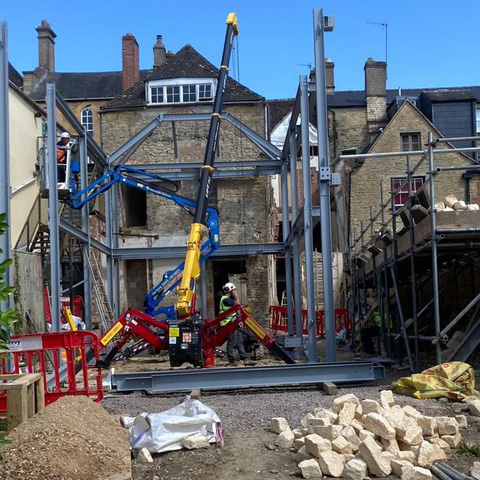Behind the picturesque beauty of Chipping Norton, lies an ugly fact. The town is home to one of the most deprived neighbourhoods in West Oxford.
St Mary’s Church has responded in an innovative way, collaborating with other local charities and services. The result is that a former Nat West Bank building is having a £4m make-over to become a new community hub for the town, called The Branch.
 The congregation of St Mary’s Church has been deeply involved in the project, which will see the doors of the new centre open shortly. It’s just one of the activities that the Revd James Kennedy, Rector of St Mary’s, and his wife, Emma, have been focussed on during their ten years in the town.
The congregation of St Mary’s Church has been deeply involved in the project, which will see the doors of the new centre open shortly. It’s just one of the activities that the Revd James Kennedy, Rector of St Mary’s, and his wife, Emma, have been focussed on during their ten years in the town.
“Opportunities for children and young people rank in the bottom ten percent in England,” says James.
“Employment prospects for school leavers are in the lowest five percent nationally. Individuals and families are failing to thrive, and access to support services is limited,” he says.
The Branch is the local response to this need. A generous gift of an interest-free loan of £150,000 got the project underway. Contributions from others, including The Diocese of Oxford, enabled the old bank building to be bought. Then Covid arrived.
With lockdown the needs were very clearly highlighted to the local community. Those with significant means were also tied down locally and helped us to address that, helping to fund the redevelopment.
Emma Kennedy told the Oxford Mail that, “The Community Hall will be an essential flexible space that will accommodate youth activities and courses, working in collaboration with voluntary and statutory services to work holistically with individuals and families.”
A small full time staff is being recruited working alongside a large volunteer workforce, many with a church background.
“We trying to partner with the wider community and the agencies involved with the motivation of love and wanting to reach out to the most vulnerable,” says James.
The Branch has been born out of the desire to ‘love our neighbour and serve the local community’. It recognises each individual and family unit as unique.
We’ve create a space where they can grow holistically,” says Emma, “Confronting and removing barriers, creating connection, offering opportunity and then step into playing a meaningful part in their community. By investing in and releasing potential, through nurture, training, connection and opportunity, we aim to break cycles of poverty, isolation, violence and disadvantage once and for all.”
